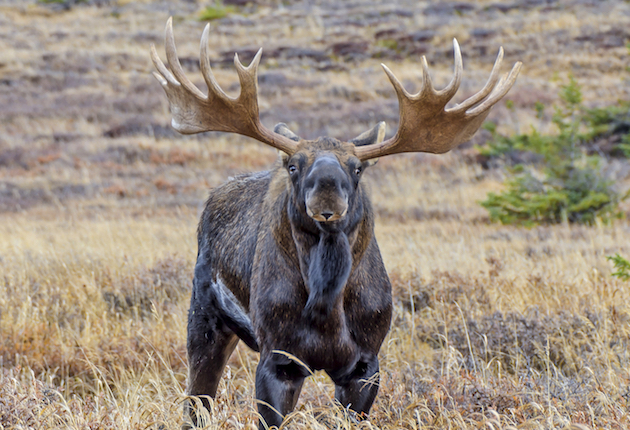The conclusion of yesterday’s “Treed by a Moose,” an excerpt from Willis Boyd Allen’s The Red Mountain of Alaska, published 1889.
As soon as Joe, the younger and more agile of Mr. Dutton’s two Indian guides, struck into the forest, he formed a definite plan of action in his mind.
He had seen his young master start off in his expedition and had noted the direction he had taken. Once out of sight of camp, the trail was lost in the deep green moss that covered the ground everywhere. Joe, however, was not at a loss for the route he should take. He reasoned that the boy would, in the main, keep the direction he had at first taken, and would follow the stream up toward the hills, good shooting being generally found near water. Moreover, the brook would be an infallible guide back to camp.
Swiftly and stealthily as a cat the Indian glided through the dark shadows of the forest, in and out among the trunks of the evergreens. Now and then he would utter a grunt of satisfaction as his quick glance fell upon a broken twig or a red mass of crumbling wood where Robert had placed an incautious foot.
Arriving at the bear path, he did not hesitate a moment, but followed it with a swift, shambling gait like the awkward trot of the animals who had trodden down the path for him.
When he perceived the big track in the mud, he started, paused, and examined it carefully; then felt of the handle of his long knife—he had brought no other weapon—and kept on as before.
If you had been watching him, a few minutes later, you would have seen him suddenly come to a standstill, listen eagerly, and then creep forward on hands and knees. Presently, he dropped flat on the ground and began wriggling forward as silently as a snake, but more slowly.
From his perch, Robert caught sight of a dark figure crouching on the moss, a hundred feet away to the leeward. At first he turned sick with fear, thinking it was a puma making ready for a spring. Then he recognized with delight the homely features of his guide.
The moose just then was wandering moodily about, at about the same distance on the other side of the tree, his attention being distracted by a swarm of mosquitoes who kept him stamping and licking furiously. It was evident that he had not the least idea of the Indian’s presence.
The latter wriggled nearer and nearer the tree, until, at last, he could lay his hand on the repeating rifle.
The slight noise he made in cocking the piece caused the moose to look up quickly, half turning as he did so, and exposing his broad, brown side. A shot rang out, and another. The moose started for the tree like lightning, but before he had covered half the distance he fell headlong. To leap to his side and plunge the keen blade of the knife into his throat was but an instant’s work for the Indian, who had despatched many a moose in his day.
As Robert descended stiffly from his tree and saw the poor creature’s huge bulk stretched out, helpless and still, he felt a pang of remorse.
“It’s too bad, Joe,” he said, gazing at his prostrate enemy.
“H’m. You no kill ‘im, he kill you,” remarked the other in soft gutturals. “You lucky git ‘way from ‘im, yis.”
They cut several slices of meat from the moose, and Joe took especial pains to carry away the muzzle, or upper lip, which is esteemed a dainty among hunters. The magnificent antlers they were obliged to leave behind.
The Indian had as yet made no allusion to the bear. When they had traveled about halfway to the camp, and had been walking in silence for some time, he suddenly asked, “You shot at bear, too?”
Robert laughed rather shamefacedly.
“Yes, I did, Joe. I guess I didn’t hurt him much, and I’m glad I didn’t. One of those splendid creatures is enough to kill in a day.”
“You no fire when you see ‘im ‘gain,” remarked the Indian. ” No hurt poor bear,” he added.
Rob caught the twinkle in his companion’s eye.
“You’re laughing at me, old fellow!” he cried good-naturedly. “Nevermind. I’ll pay you up some day.”
“No shoot bear when you ‘lone,” said Joe, more soberly. “Nor moose, too. Wait for Injun come, he help shoot.”
“Well, I’ll be more careful another time. Hullo, here we are at camp. Sorry you were worried, father,” as he saw Mr. Dutton’s look of relief at his approach.
“I was worried, Rob,” said the older man earnestly, “and I thank God that you’re back safe. If I had realized half the dangers and hardships of this wild country, I’d never have come. I suppose Joe is used to them, and don’t mind meeting a grizzly, or fighting mosquitoes for a week at a time, or running into a tribe of hostiles, but I confess I do.”
“But, father,” Robert said, “we were never so well in our lives.”

